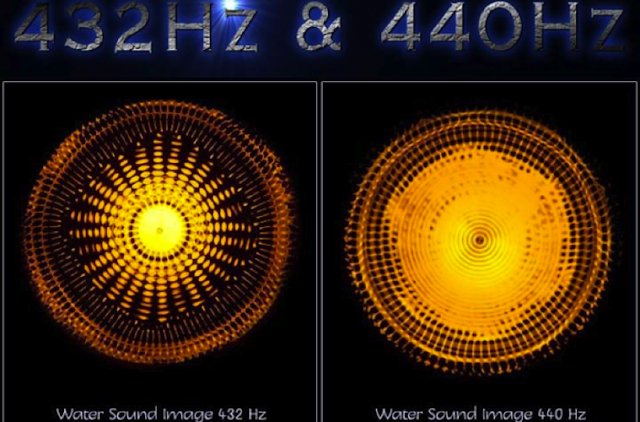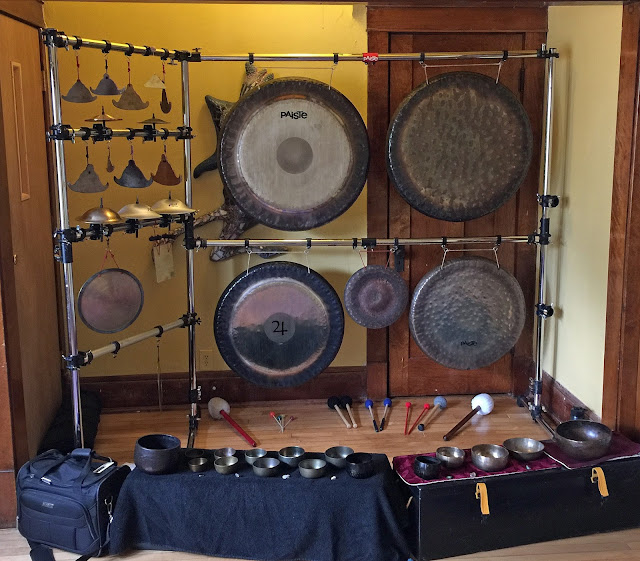Where Do We Go From Here? [Part 3]
There's no way to avoid it. There are always 2 sides to everything. It's the nature of the Universe.
And so there is also 2 sides to every story. In Part 1, we looked at facts that were more or less wishful thinking. In Part 2, we looked at how wishful thinking, or more accurately, intent, may actually create our Universe. So where do we go from here?
If you play Gongs/Bowls/Bells long enough, it becomes clear that something is happening. It may be difficult to put your finger on exactly what is happening, but you know something is. And this something may be experienced differently by each and everyone of us. So that makes trying to find a solid answer a bit of a sliding floor.
Perhaps the preeminent philosopher of the 20th century, Alan Watts, may have hit on the ultimate answer:
Black/White
Up/Down
In/Out
Left/Right
Hot/Cold
Good/Evil
And so there is also 2 sides to every story. In Part 1, we looked at facts that were more or less wishful thinking. In Part 2, we looked at how wishful thinking, or more accurately, intent, may actually create our Universe. So where do we go from here?
If you play Gongs/Bowls/Bells long enough, it becomes clear that something is happening. It may be difficult to put your finger on exactly what is happening, but you know something is. And this something may be experienced differently by each and everyone of us. So that makes trying to find a solid answer a bit of a sliding floor.
Perhaps the preeminent philosopher of the 20th century, Alan Watts, may have hit on the ultimate answer:
To Speak The Truth
As you make more and more powerful microscopic instruments, the universe has to get smaller and smaller in order to escape the investigation. Just as when the telescopes become more and more powerful, the galaxies have to recede in order to get away from the telescopes. Because what is happening in all these investigations is this: Through us and through our eyes and senses, the universe is looking at itself. And when you try to turn around to see your own head, what happens? It runs away. You can't get at it. This is the principle. Shankara explains it beautifully in his commentary on the Kenopanishad where he says 'That which is the Knower, the ground of all knowledge, is never itself an object of knowledge.'
Think about it, Science used to think the atom was the smallest particle, but when they finally looked at the atom, they discovered electrons. When the looked at electrons, they discovered sub-atomic particles, and so on. We are in a game that never ends.
So too with sound. Playing the Gong/Bowl/Bell is just the surface. Once we have spent some time with them, we realize there is more beneath the surface of the sound. And as we look deeper into the sound, we find more and finer sounds. And we also realize more and finer affects that the sound has on us, on our bodies, on our energy systems, on our very souls.
Thus we have a responsibility to pay attention! Pay attention to what we are doing, what we are saying, what we are experiencing. And so too we need to pay attention to what we are presenting to others. It's no secret that sound can have a great impact on people. Just look at how music permeates our everyday lives.
In his book, Thou Art That: Transforming Religious Metaphor, the great mythologist, Joseph Campbell wrote:
Artists provide the contemporary metaphors that allow us to realize the transcendent, infinite, and abundant nature of being as it is.
This fits perfectly with what the great 19th century poet, Rainer Maria Rilke, wrote in his book, Letters On Life:
Art is not a making-oneself-understood but an urgent understanding-of-onself. The closer you get in your most intimate and solitary contemplation or imagination (vision), the more has been achieved, even if no one else were to understand it.
You must first understand yourself, and what you are doing (at least as much as you can), before you can understand what affect you are having on others. And even after all the doing and understanding, life goes on. The mundane remains and you continue about your journey. The great Buddhist teacher and writer, Thich Nhat Hanh, in his book, How To Eat, reminds us to live the everyday:
Wash every bowl, every dish as if you are bathing a baby— breathing in, feeling joy; breathing out, smiling. Every minute can be a holy, sacred minute.
Be holy.
Be sacred.
For you are a telescope, expanding the Universe as you reach further into the sound.
Be sacred.
For you are a telescope, expanding the Universe as you reach further into the sound.
~ MB
Chop Wood / Carry Water / Play Gongs™




Comments
Post a Comment